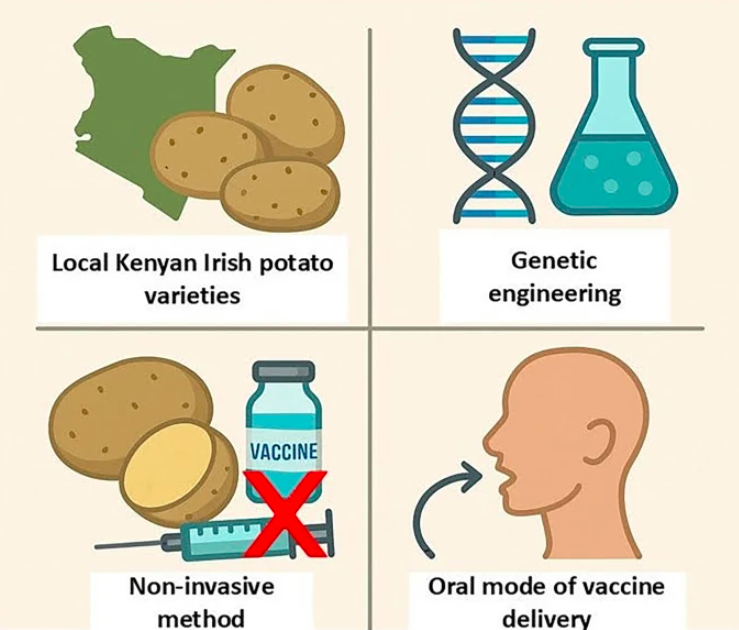 Plant-based edible vaccines are environmentally sustainable, safe, with high scalability and have the potential for bulk production at reduced costs and time.
Plant-based edible vaccines are environmentally sustainable, safe, with high scalability and have the potential for bulk production at reduced costs and time.
Despite vaccines efficacy, nearly 14.5 million infants remained unvaccinated in 2023, with 60 per cent from developing nations, highlighting the lack of access to immunization and healthcare facilities.
Immunisation possesses significant drawbacks such as inadequate research, production costs, distribution, storage, delivery and a lack of administering infrastructure. Certain DNA vaccinations against specific diseases are unreliable, expensive and result in adverse immunological responses.
These vaccines include high price tags and pose challenges in storage and transportation due to their refrigeration requirements. Consequently, the lack of storage facilities and high manufacturing costs of vaccines impede their ability to protect millions of lives worldwide.
Therefore, it is essential to investigate easily administered, storable, and widely accessible vaccination strategies and delivery techniques, particularly in resource-limited countries.
In this context, ‘edible vaccines’ serve as an efficient alternative and can annihilate the restrictions incurred with conventional vaccines. The oral administration of therapeutic agents such as vaccines is advantageous because of their self-administration ability, safety, better patient compliance and ease of distribution.
Progressive advancements in natural sciences, plant biotechnology, and genetics have significantly enhanced our understanding of infectious diseases and enabled the creation of plant-based edible vaccines.
Developing plant-based edible vaccines (food, oral,
subunit, and green vaccines) offers a promising and innovative approach with
numerous advantages. These are subunit vaccines that incorporate stable gene
expression into the nucleus or chloroplast regions of the genome of suitable
vegetables or fruits, including potatoes, bananas, and tomatoes.
It facilitates the production of complex recombinant proteins with proper folding while easing their transformation, expression, functional stability, and purification. These plants are engineered to express specific antigens, necessitating a basic understanding of agriculture and plant cultivation.
Notably, edible vaccines eliminate the need for purification and downstream processing, which are the cost drivers in conventional vaccine production.
These edible vaccines are currently under development for various human diseases, including hepatitis B, C, and E, measles, cholera, and foot-and-mouth disease. Additionally, ongoing research is exploring the potential of this innovative technique to mitigate severe SARS-COV-2 infections.
Furthermore, plant-based edible vaccines are environmentally sustainable, safe, with high scalability and have the potential for bulk production at reduced costs and time. Their significance lies in eliminating downstream processes, refrigeration during storage and the need for qualified medical staff for delivery.
In conclusion, edible vaccines hold immense potential to revolutionise the field of immunisation and disease prevention. They provide numerous benefits compared to conventional immunisations by employing genetically engineered plants and novel delivery techniques.
Nonetheless, addressing safety concerns, regulatory considerations, and public acceptance are critical for the successful implementation of this groundbreaking technology.
Although edible vaccinations are not currently accessible, progress in agriculture and biotechnology suggests a future where immunisation could be administered through the consumption of tomatoes.
Although traditional vaccines have a crucial role in improving global health, their production in large quantities is expensive and time-consuming. Developing edible vaccines offers a potential solution to these challenges.
This innovative approach holds the promise of
delivering enhanced, safer, and more effective immunization and disease
prevention measures, particularly for life-threatening diseases that impact a
significant portion of the global population, such as dengue, malaria, AIDS,
heart diseases and respiratory disorders.
Moreover, in future, the crossing of two different generation plants with varying types of gene expressing clinically relevant antigens could yield a multi-component vaccine with adjuvant properties.
Since the completion of the initial human clinical trials for plant-based vaccines, various challenges have emerged, including the need to optimise expression levels and ensure stability during post-harvest storage.
The long-term effects of edible vaccines have yet to be fully determined, including the possibility of undiscovered delayed reactions. Additionally, the inclusion of a specific adjuvant, either fused with the candidate gene or administered separately, can enhance the immunogenicity of orally delivered edible vaccines.
Ongoing research and development will assess whether edible vaccines can meet the quality standards set by the World Health Organization (WHO), including potency, efficacy, purity, and safety. If successfully developed, these vaccines could offer a single-shot solution to prevent widespread diseases worldwide.

















